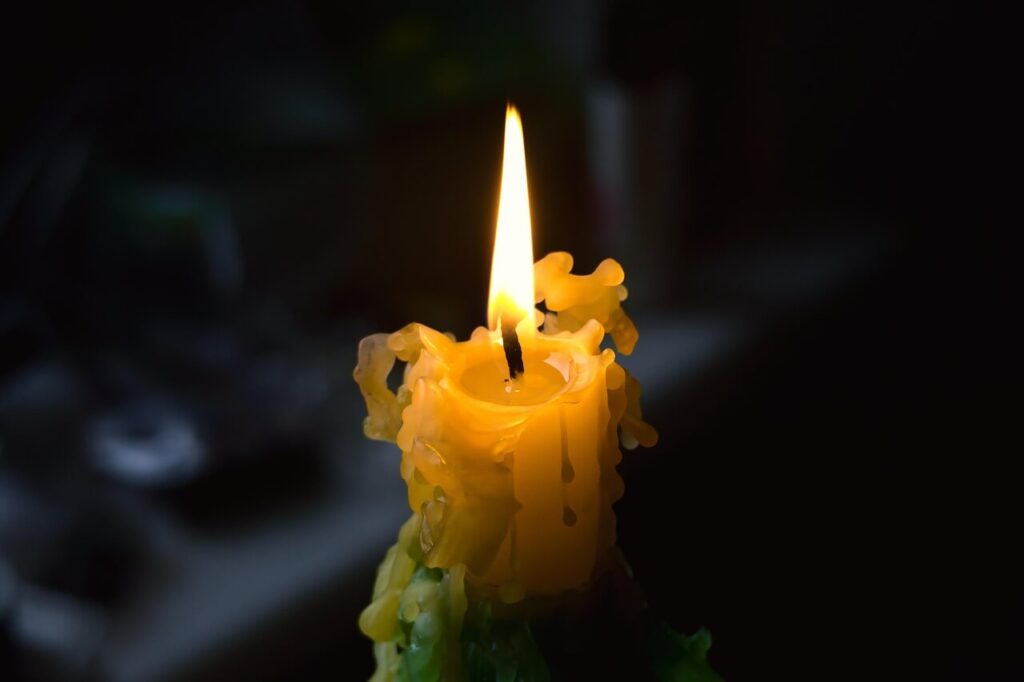Havdala is the Jewish ritual for ending Shabbat.
Havdala is the Jewish ritual for ending Shabbat.
The Hebrew word Havdala means “separation” or “distinction”. The ritual takes place on Saturday
night, when it is dark and three stars can be seen in the sky. It is a liminal rite that helps us move from one time to another while paying attention to the space in between. The magical themes of boundary and sensation are detectable in this ritual. We engage our physical senses- tasting wine, smelling spices or fresh herbs, seeing the light of the two-wicked candle. Tonight, we invite you to incorporate gratitude into the Havdala ritual. You will need a braided, multi-wicked candle (or two candles held together), a cup of wine, and some sweet smelling spices or herbs for this ritual. Begin by lighting the candle and pouring the cup of wine (or grape juice) and then raising up the glass, to recite the ritual…
Below is the traditional text of Havdala (according to the Ashkenazi tradition),
along with some gratitude questions and reflections.
Havdala Ceremony
Recite the opening verses:
Behold, God is my savior, I will trust God and not be afraid, for my strong faith and song of praise for God will be my salvation. You will draw water joyously from the wellsprings of salvation.Salvation is God’s; may Your blessing rest upon Your people. God of the heavenly armies is with us; the Lord of Ya’akov is a fortress protecting us. God of the heavenly armies, happy is the individual who trusts You. God, redeem us! The King will answer us on the day we call God.
The Jews had light, happiness, joy and honor; may we have the same.
I will raise the cup of salvation and call out in the name of the God:
Raise the cup of wine and bless:
Blessed are you, Lord our God, creator of the fruit of the vine.
Raise the spices, bless and smell the spices:
Blessed are you, Lord our God, creator of different spices.
Lift up the candle, bless and look at its light:
Blessed are you, Lord our God, creator of the light of the fire.
Recite the final distinction blessing:
Blessed are You, Lord our God, King of the universe, who distinguishes between the holy and the profane, between light and darkness, between Israel and the nations, between the seventh day and the six working days. Blessed are You, O Lord, who distinguishes between the holy and the profane.
טקס הבדלה
הִנֵּה אֵל יְשׁוּעָתִי אֶבְטַח וְלֹא אֶפְחָד כִּי עָזִּי וְזִמְרָת יָהּ ה’ וַיְהִי לִי לִישׁוּעָה וּשְׁאַבְתֶּם מַיִם בְּשָׂשׂוֹן מִמַּעַיְנֵי הַיְשׁוּעָה לַה’ הַיְשׁוּעָה עַל עַמְּךָ בִרְכָתֶךָ סֶּלָה ה’ צְבָאוֹת עִמָּנוּ מִשְׂגָּב לָנוּ אֱלֹהֵי יַעֲקֹב סֶלָה ה’ צְבָאוֹת אַשְׁרֵי אָדָם בֹּוטֵחַ בָּךְ ה’ הוֹשִׁיעָה, הַמֶּלֶךְ יַעֲנֵנוּ בְיוֹם קָרְאֵנוּ.
לַיְּהוּדִים הָיְתָה אוֹרָה וְשִׂמְחָה וְשָׂשֹׂן וִיקָרּ כֵּן תִּהְיֶה לָנוּ.
כּוֹס יְשׁוּעוֹת אֶשָּׂא וּבְשֵׁם ה’ אֶקְרָא
בָּרוּךְ אַתָּה ה’ אֱלֹהֵינוּ מֶלֶךְ הָעוֹלָם בּוֹרֵא פְּרִי הַגָּפֶן.
בָּרוּךְ אַתָּה ה’ אֱלֹהֵינוּ מֶלֶךְ הָעוֹלָם בּוֹרֵא מְאוֹרֵי הָאֵשׁ.
בָּרוּךְ אַתָּה ה’ אֱלֹהֵינוּ מֶלֶךְ הָעוֹלָם הַמַּבְדִּיל בֵּין קֹדֶשׁ לְחוֹל בֵּין אוֹר לְחֹשֶׁךְ בֵּין יִשְׂרָאֵל לָעַמִּים בֵּין יוֹם הַשְּׁבִיעִי לְשֵׁשֶׁת יְמֵי הַמַּעֲשֶׂה בָּרוּךְ אַתָּה ה’ הַמַּבְדִּיל בֵּין קֹדֶשׁ לְחוֹל.
Reflection Questions:
As you drink the wine:
- What moments of joy and celebration are you especially grateful to have had?
As you smell the sweet spices:
- Think of another person who means a lot to you.
- What about them, would you like to inhale?
- In what ways do they fill your life with sweet sensations?
As you see the light of the braided or double-wicked candle:
- Who and what makes you shine more brightly?
- In what ways are you a better person, when intertwined with someone else?
After reciting the final blessing of distinction:
- What are your unique, distinct qualities, for which you are grateful?
- What boundaries or distinctions do you need in order to be able to recognize others?
- How can you create and delineate time and space in this coming week to make room for appreciation?
One of the key verbs in Genesis, Chapter One, is b-d-l, “to separate, distinguish, divide,” the root of the word Havdala. It appears five times in the chapter. By inviting human beings to engage in Havdala at the end of Shabbat, God invites us to create worlds. Creation involved the ability to make distinctions, to rescue order from chaos, to respect the integrity of creation. Havdala is thus not only a human blessing over the end of the day of rest, but as it were a divine blessing over the days of work.
The Creator invites us to be creative – but always and only in a way that respects differences and distinctions, the laws of nature and the moral law. The message of Havdala is: if we respect the integrity of boundaries, we can turn chaos into order, darkness into light.
– Rabbi Jonathan Sacks, Koren Siddur
